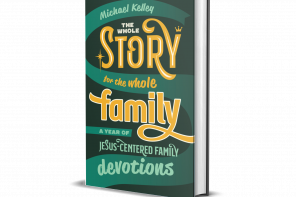It happens around this time every year now. It’s part of our regular family rhythm, so much so that it doesn’t mean as much to us as it used to. Today is the day our son, Joshua, visits the Survivor’s Clinic for childhood cancer survivors.
Joshua was diagnosed with leukemia when he was two, and we walked through three and a half years of chemotherapy treatments with him. Those were hard years. Years of hair loss. Of painful sores. Of all night stints in the hospital. But looking back on those years now, they were also the most formative years of our lives.
Perhaps this is one of the ways the Lord works. He uses these times of difficulty in our lives steadily, constantly, and yet sometimes almost imperceptibly. We didn’t know just how dramatically God was changing us during those three years; it was only after the fact that we saw how God used our son’s cancer to expose things in us we didn’t even know we were there. I saw my own self-centeredness and fear of responsibility. I saw my unwillingness to sacrifice and my preoccupation with my own dreams and aspirations.
Along with that, I’d hope and pray that God also built up some things in us. Things like faith. Perseverance. Empathy. Generosity. I hope.
I suppose you might look at that and say that we owe a debt of gratitude to cancer. But I disagree.
I would never write a thank you note to cancer.
Cancer is terrible. Disease is terrible. Job loss is terrible. Many things in the world are terrible. To say otherwise is not just naive; it’s a denial of things in the world that are simply evil. Perhaps we should take a lesson from the theology of Joseph in this respect.
To refresh your memory, Joseph knew something about difficult circumstances. If you read the account of life in the book of Genesis, it reads like a yo-yo – constantly fluctuating circumstantially from being on top of the world to being in the pit (sometimes literally) of despair. Here was a young man who heard from the Lord through a dream about a future of great prominence. And yet his brothers sold him into slavery. He was promoted to be in charge of his master’s house in Egypt, and yet was betrayed by his master’s wife through false accusations of sexual impropriety. And so the story goes until Joseph at last found himself living the circumstances of his dream those many years earlier.
He was the second most powerful person in the world, and in control of the food stocks of Egypt when there was a terrible famine in the land. And who should come knocking on the palace door but those same brothers who had left him for dead? What was Joseph’s summation of his life in speaking to these brothers?
“You planned evil against me; God planned it for good to bring about the present result—the survival of many people” (Gen. 50:20).
Joseph didn’t write a thank you note to his brothers, saying that if they hadn’t sold him to the slave traders then he wouldn’t be in the position he was in. Instead, he acknowledged the evil they had done, and the evil they had in their hearts when they did it. But at the same time, he acknowledged the power of God to take what was meant for evil and turn it for good.
You’ll forgive, I hope, the simplicity of the illustration, but I’m not going to thank the hammer of a carpenter I hire to do work on my home. I would instead thank the carpenter who used it. In a similar way, I don’t owe a debt of gratitude to cancer any more than Joseph owed one to his brothers. Both cases only show the skillfulness of the One wielding these terrible tools of circumstance for good.
Of course, it takes a long time to get there. And that’s okay. God plays the long game with our hearts, making them what He wants them to be.
By His grace, we will all at some point come to the same conclusion that Joseph did. One in which we can acknowledge real evil and suffering for what it is, and at the same time give thanks to God who can take what is bad and use it for good.
Subscribe to MichaelKelley.co
Never miss a new post. Subscribe to receive these posts in your inbox and to receive information about new discipleship resources.




